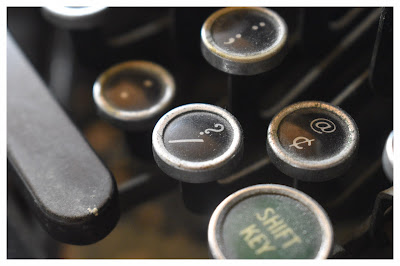So this week's subject is how to get started on yiur next novel. What do you have reeady to go before hyouremready to go as it were.
Wel, that's an interestintg question, especially since Im a pantser. I basically just sit down ad start. I don't have a list of prepared character names. I don'tnusually do outlines. I have never even once filled out charcter cards, though the idea always sounds interesting to e. No 3x5 index xards, no tree of possibe scenes. It just isn't my thing.
I have nothing, ecept a vague notion of what I want to see when it's all said and done. I MIGHT have a few vague ideas for scenes in my head, but the closest comparison I cn give is a few stepping stones to help e across the river as I start my walk.
Here's the thing: for me, half the fun is the mystery. I know that I'll need a town before it's all said and done. I often prefer small town settings, because there' a certain level of intimacy to them that is washed away in big city settings. I know I'll ned a few character, but I like to learn about them the same way that readere learn about them. That is to say I like to learn abot them as I move throgh the story. It is eceedingly rare for me to have a well deeloped notion of what a chaaracter will become as the story progresses, because I DO think chaarcters should change as they move through a tale. Like all of us, they shouod be shped by their surroundings by their past, and by what happens to them in every day events.
Let me put thT in a slightoy different way. When I strted writing I was a very different peron than I am now. My beliefs were different, my lifestyle was certainoy different, and I promise you the me from 25 years ago would have never expected the me that lives in my skin now. I have eveolved as a result of life events, changes in my environment, and incidents that reshaped me in commpketeoy unexpected ways. I bet if you look back even a decade, you can say the same and if I am wrong, yu are very much an exception to the rules.
Oh, some things haven't changed much. I still love Halloween and I think Stephen King is about he best writer out there these days. I think my writing has evolved immensely, and I know that my opinions arent what they were half a lifetime ago. I have, in some ways, become jaded. I have, in other way, remained remarkaboy the same.
But what has n9t changed is my preference to go into a story with onoy a seed of an idea. I find the mysteries that unfod as I write are haof the fun. I can look back at my very first novel, UNDER THE OVERTREE, and I can remember how surprised I was by some of the charctes. Lisa Scarabeeli comes to mind. I made her to be a throaway. She was supposed to die horribly in the story, but she surprised me No matter what I hit her with, and I hit her ith a LOT, she simply would not die. If I had outlined the novel as thoroughy as some writer I know, that wouodnt have happenede She'd have asted two scenes and then she wouod have been gone I would have lost tht element of surprise.
A writer I knew for a long time. Rick Hautala, once had a long debate with me about that Rick outlined everything meticulousy, effectively writing so detiled an outline for himself that it wouod tke 20,000 words to finish the outline he wouod then flesh out that that outline and have a finished novel. I toold him then, and I still hold to it, tht for me, the element of surprise is removed by having a detailed outline. I can no longer surprise myself, so how can I expect to surprise the reader?
He never quite got that. That's okay, I couod never quite work my wy through his form of outlining, either.
The thing to remember is that there is nio right ot wrong in writing. There is only what is right or wrong for YOU.
Do you need an outliune? Maybe you do. All I need are my aforementioned stepping stones Brief snippets of scenes thT might or might not actually take place in my stories. I had one scene in y head when I started writing that first novel. It was a scene tht wouod not leave me alone and I wrote un til I had that scene fleshed out properly, which was roughoy fifteen thousand words in three days. By the time I had finished writing that scene, I knew what the next few importaant beats in the story wouod be and that was how I kept writing. 178,000 or so words later, I had finished my first novel's first draft.And I was happy with it, and I still am. Oh donpt get me wroing, I'd have written a very different story than what I wrote then if I were to start with the same seed as I did back in the day. I am, as I have already sid, a very different person than I was back then. Different aspects of the sme tle woulde ahve been moe important to me if I wrote the book today instead of in the pst.
Here's what I really need to get strted i need an idea. I need at least one scene that I a desperately eage to write, and I need to hav4 a vague notion of what I want to have hapening somwhere near the end of the book. That's it. everything else isw done spur of the moment. i do not have a list of nakes, when I start. I make them up as I go. Those names will be added to a one or two page leicon as I go along. Especially in a fantasy settting where the names are markedly different than the common names I find in my world. That lexicon will include the naes of characters, often with a one sentence description to help me remembr imortant things about them. Tyler wilso-smart ass-nerd-very near sighted, wears glasses. Mark Howell--overwight, dremer, holds a grudge. cassie Monroe, athletic, jogs every day, is adrift emotionally. Thaat's three chrcters and as fleshed out as they were when I started.
I do the same with locations: Summitvikle, small town, near a big lake, xenophobic atmsphere.
How much mire do you need?I want enough to fire my neurons and remind me of the peron/place. That's all. I don;t outline.I ask myself questions. I don't answer them diretly. I answer them in the story. I might add in the name of good friends or family member as I go. Cindy Howell, Narks mom, was fifteen when she had her son. Blonde hair.
The rest is details, The notes are the clay I'm sculpting from as it were. I don't want more than tht I want the shpe and teture nd design to suprise me as I go along.
Probaboy thtt isnpt a helpful pile of inforation I know most of the writers I deal with hve very different processes than I do. I collaborte with riters with fair regularity and most of them outline much more than I do, The exception is my friend Chrles rutledge, with whom I regularly collaboraate. Charles is as weird s me, and whoile we ahve written several novels and novellas together, the closest we've ever come to an outline is about three sentences worth of story idea, followed by a luch meeting ot two when we were halfway through a book. But as I have waid before, I'm not normal and neither is Charles.The first novel we worked on together, BLIND SHADOWS, took us three weeks to write. The second novel we worked on together, CONGREGATIONS OF THE DEAD took us two weeks. The third, A HELL WITHIN, was about five months, The thing is we had three books and a novella come out of bout hree sengtences. We should do a story with the local cop and a detective who run across a monster when they're just going abiut their normal days. Mayne set it in the mountains. Do it sa a crime story, but there's also this supernaatural thing going on, too.
That was enough. We had a blast firing chptes back and forth on each and every tale.
I say again, and with feeling, tee is no right or wrong way, theres onoy the way that works for you.






























